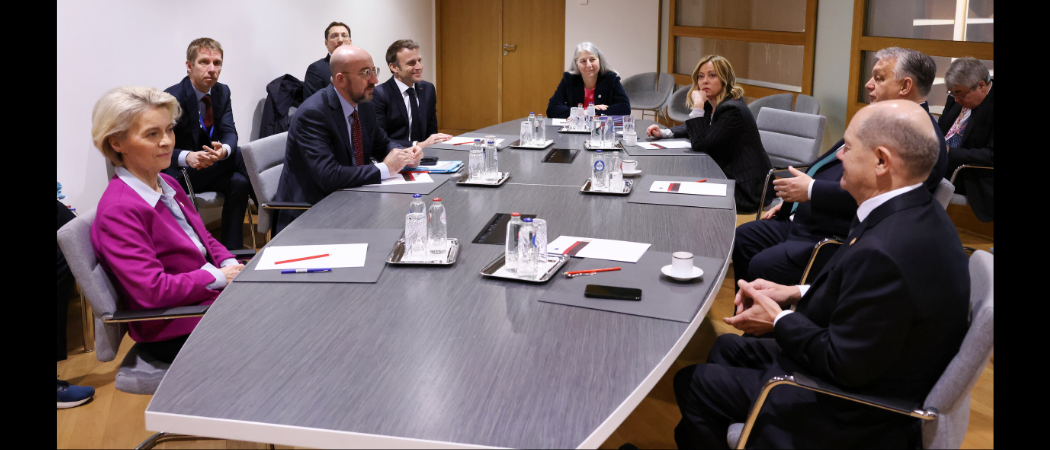Heads of state approved the changes in Brussels today, after Germany rejected a Commission proposal to put an additional €100B into the EU’s multiannual budget. The deal frees up a €50B aid package for Ukraine

EU leaders meet with Hungarian Prime Minister Viktor Orbán to discuss an aid package for Ukraine, which Orbán had vetoed in December. Photo: European Union
Horizon Europe will have its €95.5 billion budget cut by €2.1 billion, with €1.5 billion diverted to defence research, following an agreement by EU heads of state at a meeting in Brussels today.
The raid on the research programme’s funding is part of a €64.6 billion rejig of the EU’s multiannual budget, to accommodate the growing costs of supporting Ukraine in its war against Russia.
The bulk of that amount, €50 billion, will go to Ukraine, but the EU also needs additional money for migration and border management, foreign aid to other neighbouring countries, and €1.5 billion in additional cash for the European Defence Fund (EDF), the EU’s main fund for military technology R&D.
The EDF top-up will ultimately go towards EU’s latest bid to increase its capabilities, the Strategic Technologies for Europe Platform (STEP), a new mechanism for targeted investments in deep tech, clean tech and biotech, to ensure that EU can compete against the US and China in these fields.
EU leaders agreed they will further discuss issues related to defence technology at their next meeting in March.
The budget deal has been on the table since in December but, at the time, Hungarian prime minister Viktor Orban wanted to include a clause in the Ukraine package which would have given Hungary a veto over the disbursements of aid to Ukraine every year. Instead of a veto, EU leaders convinced Orban to agree to an annual review of the aid package.
The deal is positive for Ukraine, which is struggling to fend off Russian attacks, as its internal resources are dwindling and aid from the west had been stalled due to political opposition in Brussels and the US.
The €2.1 billion cuts for the €95.5 billion Horizon Europe research programme comes in the face of repeated warnings by the research community and by EU research commissioner Iliana Ivanova.
In a recent exchange of views with the European Parliament’s industry and research committee, Ivanova said Horizon Europe’s predecessor programme Horizon 2020 was severely underfunded and needed an additional €159 billion to fund all high quality proposals.
The economic analysis behind that figure was later confirmed in the Commission’s own analysis of the 2014 – 2020 Horizon 2020 programme.
In the meantime, research stakeholders are getting ready for negotiations on Horizon Europe’s successor programme, FP10, which is due to start in 2028. Several MEPs have called on the Commission to propose a budget of at least €200 billion, while the president of the European Research Council Maria Leptin said the budget for FP10 should be at least double that of Horizon Europe.





 A unique international forum for public research organisations and companies to connect their external engagement with strategic interests around their R&D system.
A unique international forum for public research organisations and companies to connect their external engagement with strategic interests around their R&D system.